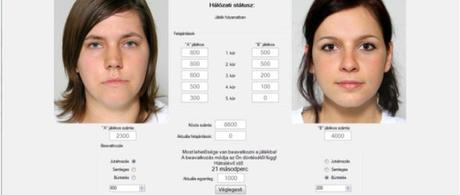
Humans are social animals. We work together to achieve things that none of us could create individually. However, this makes it possible for some people to exploit our culture. They get other people to share resources with them; but never return the favour. These " free-riders " are the cause of an evolutionary arms race as the deceiver tries to get away with it whilst the victim tries to catch them out. Might beauty be a weapon in this race? New research suggests that attractive people are punished less for cheating.
A group of Hungarian researchers conjured up a series of scenarios in which one individual cheated at a game, whilst another played by the rules. Third party subjects were then given a picture of the participants and asked to dole out a punishment to the cheater and a reward to the nice one. They were also asked to rate how annoyed they were with the cheater.
They found that when an attractive picture was used for the cheater they received less punishment than when it was an unattractive cheater. Additionally, beautiful co-operators received a larger reward than unattractive ones. People also got much angrier with unattractive people when they cheated.
Long story short, attractive people were punished less for breaking the rules and rewarded more for obeying them.
The researchers hypothesise that this may be linked to the emotional responses to beauty and cheating. Beautiful people make you feel good; counteracting the negative reaction to cheating somewhat (and amplifying the positive reaction to co-operation). Alternatively, they suggest that it may be a sub-conscious effort to get in the good books of the beautiful person; increasing their sexy chances with them at any future meeting.
Because of these factors, might the evolution of "beauty" been partly influenced by a drive to get away with things?
This research can't determine which - if any - of these explanations are right. And that's something the scientists acknowledge, noting they simply didn't examine enough variables to pick apart all these hypotheses. More research - they say - is needed to figure out why beautiful people get away with it.
However, whilst they are rightly critical of various interpretations of these conclusions they aren't that critical of the conclusions themselves. And they should be since there are plentiful issues.
The biggest of which isn't my usual rant about WEIRD samples. But rather, the fact that there was no real control used in this research. They always compared an unattractive X with an attractive Y. Never two attractive people, never any "average" person. This is a huge oversight that means we can't rule out a bunch of other possible factors. How do we know people weren't biased for the attractive person; and it simply was a case of the two opposite ends of the spectrum creating a more extreme response?
The attractive rating of these individuals was also determined by another group. They didn't check that the participants in these experiments also found those faces attractive. This is another fairly major oversight.
And of course, there's my pet peve. They're trying to draw conclusions about all of humanity and how we feel about attractive people from a sample of 200 Hungarians. From a university. Nobody outside of the University of Pécs could be biased towards attractive people and these researchers would never know. In fact, there's a fairly good chance that most people outside the University of Pécs don't suffer from this bias.
That said, these researchers did find an interesting effect worthy of further study. It just needs even more research to prove than they think.
Reference
Putz, Á., Palotai, R., Csertő, I., & Bereczkei, T. (2016). Beauty stereotypes in social norm enforcement: The effect of attractiveness on third-party punishment and reward. Personality and Individual Differences, 88, 230-235.

